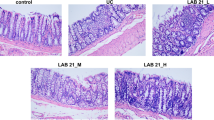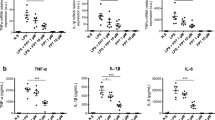Summary
Toll-like receptors (TLRs) are key components of the innate immune system which trigger antimicrobial host defense responses. This study aimed to investigate the impact of probiotics (Lactobacillus, Bifiidobacterium) on the expression of TLR4 and tumor necrosis factor-alpha (TNF-α) in the colon mucosa of rat experimental ulcerative colitis model induced by trinitrobenzene sulfonic acid (TNBS)/ethanol and immune complexes. The gross and histological changes of the colonic mucosa were observed and assessed by the means-standard deviation and independent samples t-test. The protein expression levels of TLR4 and TNF-α were detected by using immunohistochemistry and Western blotting, respectively. It was revealed that there was visible infiltration of inflammatory cells, formation of crypt abscess, and the reduction of goblet cells in the colon tissue of experimental models. As compared with the control group, the levels of TLR4 and TNF-α protein were significantly increased in the model group (P<0.01 for both). No significant difference was found in the expression of TLR4 and TNF-α between the two-week probiotics treatment group and the model group (P>0.05), whereas significant reductions were shown in rats which were treated with probiotics for four weeks as compared with the model group (P<0.01). There was no significant difference between two probiotics-treated groups. Our results implied that probiotics were likely to play a key role in protecting ulcerative colitis by reducing the inflammatory factor TNF-α expression through inhibiting the TLR4 expression in the colon tissue of experimental models.
Similar content being viewed by others
References
Sartor RB. Microbial influences in inflammatory bowel diseases. Gastroenterology 2008,134(2):577–594
Xavier RJ, Podolsky DK. Unravel1ing the pathogenesis of inflammatory bowel disease. Nature, 2007,448(7152): 427–434
Xu SY, Bian RL, Chen X. Experimental methodology of pharmacology. Beijing: People’s Medical Publishing House, 1991:11
Cooper HS, Murthy SN, Shah RS, et al. Clinic pathologic study of dextran sulfate sodium experim ental murine colitis. Lab Invest, 1993,69(2):238–249
Kaser A, Zeissig S, Blumberg RS. Inflammatory bowel disease. Annu Rev Immunol, 2010,28(2):562–573
Sartor RB. Mechanisms of disease: pathogenesis of crohn’s disease and ulcerative colitis. Nat Clin Pract Gatroenterol Hepatol, 2006,3(7):390–406
Blam ME, Stein RB, Lichtenstein GR. Integrating antitumor necrosis factor therapy in inflammatory bowel disease: current and future perspectives. Am J Gastroenterol, 2001,96(7):1977–1997
Kato K, Mizuno S, Umesaki Y, et al. Randomized placebo-controlled trial assessing the effect of bifidobacteria.-fermented milk on active ulcerative colitis. Aliment Pharmacol Ther, 2004,20(10):1133–1141
Rioux K, Fedorak R. Probiotics in the treatment of inflammatory bowel disease. J Clin Gastroenterol, 2006,40(3):260–263
Kuhbacher T, Ott SJ, Helwig U, et al. Bacterial and fungal microbiota in relation to probiotic therapy (VSL#3) in pouchitis. Gut, 2006,55(6):833–841
Rachmilewitz D, Karmeli F, Shteingart S, et al. Immunostimulatory oligonuc1eotides inhibit colonic proinflammatory cytokine production in ulcerative colitis. Inflamm Bowel Dis, 2006,12(5):339–345
Siddique I, Khan I. Mechanism of regulation of Na-H exchanger in inflammatory bowel disease: Role of TLR4 signaling mechanism. Dig Dis Sci, 2011,56(6):1656–1662
Rutella S, Locatelli F. Intestinal dendritic cells in the pathogenesis of inflammatory bowel disease. World J Gastroenterol, 2011,17(33):3761–3775
Manolakis AC, Kapsoritakis AN, Kapsoritaki A, et al. Readressing the role of Toll-like receptor-4 alleles in inflammatory bowel disease: colitis, smoking, and seroreactivity. Dig Dis Sci, 2013,58(2):371–380
Author information
Authors and Affiliations
Corresponding authors
Additional information
The authors contributed equally to this work.
This project was supported the grants from the Natural Science Foundation of Hubei province (No. 2012FFB02325) and the National Natural Science Foundation of China (No. 81000159).
Rights and permissions
About this article
Cite this article
Yang, X., Fu, Y., Liu, J. et al. Impact of probiotics on toll-like receptor 4 expression in an experimental model of ulcerative colitis. J. Huazhong Univ. Sci. Technol. [Med. Sci.] 33, 661–665 (2013). https://doi.org/10.1007/s11596-013-1177-9
Received:
Revised:
Published:
Issue Date:
DOI: https://doi.org/10.1007/s11596-013-1177-9




